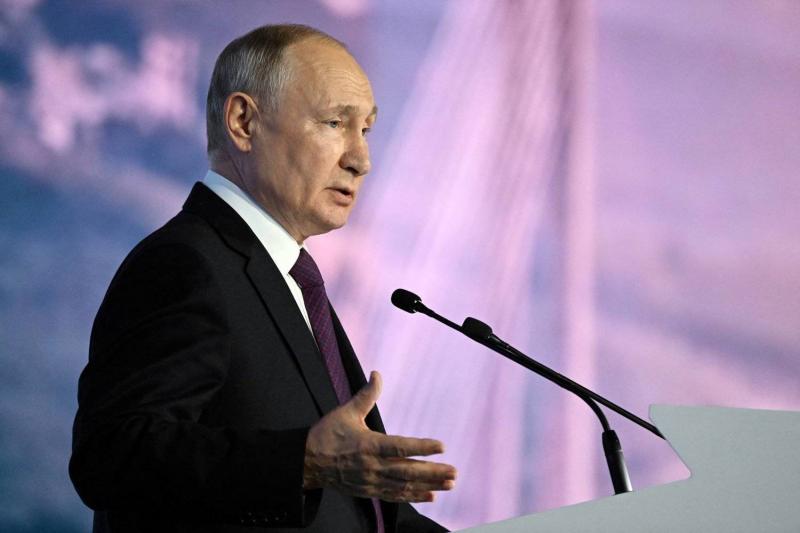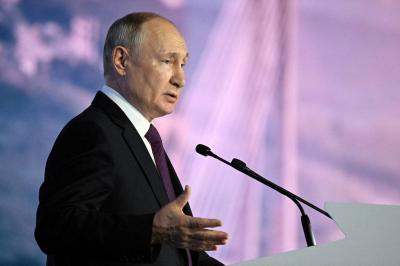It's been two years already! And how much longer? This is what comes to mind as the war in Ukraine enters its third year with no end in sight. Since war is a matter of the present; one should not expect those who are fighting it to think about its repercussions. Combatants who do so often end up losing the war. In the ongoing war, the stakes are so high that imagining an end in terms of winner and loser is mind-boggling. If Russia wins, which would mean NATO's defeat, it would be elevated to a major power, not only in Europe but on the global stage. On the other hand, if Russia loses the war, the defeat could unleash a process that may end up dismantling the replica of the Tsarist empire that Lenin called "the prison of nations."
So, what to do? I believe that Vladimir Putin is already contemplating a way out, provided that, as he has said on several occasions recently, his NATO adversaries accept a compromise that preserves face. To bolster this idea, he has raised three topics: the first involves redefining his "special military operation" as a civil war by claiming that Ukrainians are original Russians caught in an identity crisis. In his recent interview, described as an interview with American television star Tucker Carlson, he claimed that Ukrainian soldiers, when they can no longer fight, ask Russians not to shoot them because "Russians should not kill Russians."
To delve into this topic, Putin has rewritten the history of World War II. According to him, all Hitler wanted was to reunite the scattered "German" peoples. Thus, he annexed Austria amid tremendous support from the Austrians. After that, he saved the oppressed Sudeten Germans in Czechoslovakia, and faced no resistance again. The next step was to bring ethnic Germans in Danzig under the "motherland" flag, which could have been done peacefully if Poland, encouraged by the British and French, had not decided to retain them.
It goes without saying that Putin's "revisionist" narrative is riddled with gaps. If we consider it a standard for using the term "civil war," one could also see the American War of Independence as an English Civil War. World War I also began as a civil war between grandsons of Queen Victoria. Recently, the war in Indochina was a civil war involving three different parts of the French colonial "possessions" there.
But what matters is Putin's attempt to convince Ukrainians that even if they do not achieve complete victory as promised by President Volodymyr Zelensky, they will not be humiliated by someone from outside the family. Using logical jujitsu or political sophistry, if you will, one could also say that the same would apply if Russia lost the war with one group of "Russians" defeating another group of "Russians."
The second topic that Putin advances in the same interview is that he is mainly interested in the issue of "denazifying" Ukraine. He then goes to great lengths to point out that Zelensky is not among the Nazis, and in fact, the Nazis opposed him initially. Thus, if the idea of ending the war through negotiation is accepted, Zelensky, rather than being excluded, would be acceptable as a partner. Since Putin did not mention the "Nazis," it would be possible to amend Zelensky’s footnote and claim that the "Nazis" have left.
The third topic Putin raises is viewing Russia as a "historical defender of Christianity." However, he ignores the fact that Russians were a branch of pagan Vikings from the Scandinavian countries who loved moving southeast while other branches moved westward to the British Isles, northern France, and perhaps pre-Columbian America.
For several centuries, pagan Swedish barons ruled over the "Russians." The word Rus, in its Russian origin, means "rough" or "peasant" in Swedish and other Indo-European languages. Starting in 900 AD and for several centuries afterward, the "Russians" lived as nomadic pastoralists and mercenaries for the surrounding powers, eventually converting to Christianity under "Vladimir," who was a Swedish baron and future saint.
Interestingly, Putin begins Russia's history from the era of Ivan IV, known as "Ivan the Terrible" or "Ivan the Awful" (1547-1584), who defeated the Tatars and united the various Russian groups under one flag with a standing army and secret police.
Putin’s implicit goal is that the West should see Russia as a defender of the Christian world against the new Tatar threat, which he has not explicitly identified, but it is not hard to guess whom he is referencing.
In other words, he wants to be the new Ivan, reuniting all "Russians" but not to fight the West. He even claims that he asked President Bill Clinton for assistance in helping Russia join NATO to protect the Western family from threats from the East; however, his request was ignored.
When asked if he could envision a negotiated end to the war, Putin responded "yes," then added his easiest-to-fulfill desire: "but not without uprooting Nazism."
But what about the "occupied territories" in Donbas that Zelensky has pledged to liberate? They could be given a special form of autonomy under a joint administration composed of Kyiv-friendly and Moscow-loyal figures, similar to the system established in Northern Ireland, which Sinn Féin now calls "Northern Ireland."
And what about Crimea? In 2014, when Russia annexed Crimea, it had a 40-year lease allowing it effective control not only over its naval bases but virtually monopolizing key decisions regarding the peninsula.
Although Putin suffers a significant credibility gap in NATO circles, a close reading of his recent statements, including the most absurd ones about using nuclear weapons, may indicate deep concerns about losing face, which, if Russian history is any indicator, could also mean losing one’s head.
The message that is now shaping is that despite his bravado, Putin is looking for a way to save face to exit a war he must realize he cannot win on traditional terms. In this war, neither Ukraine nor NATO can surrender. Russia cannot retreat and surrender without catastrophic changes in its domestic politics.
What if this war is no longer about Ukraine but about the place Russia can – and should – have in the chaotic process of reshaping a global order that is no longer successful?




